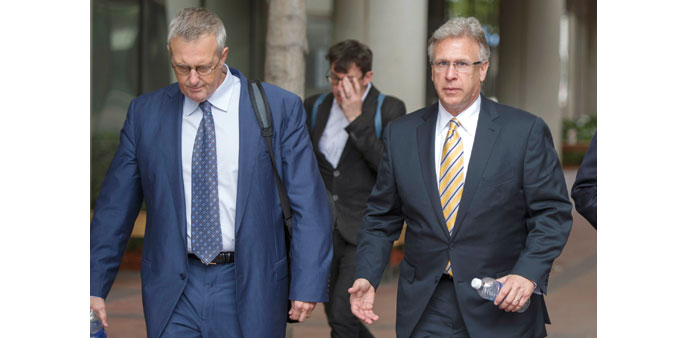Philip ‘Phil’ Schiller, senior vice president of worldwide marketing (right) and Bruce Sewell, senior vice president and general counsel at Apple, exit the Robert Peckham US Federal Court Building in San Jose on April 1, 2014. Apple, following a jury verdict that Samsung infringed three of its patents, is seeking a US sales ban on some older models of the South Korean company’s smartphones.
Bloomberg
Seoul/Washington
Apple Inc, following a jury verdict that Samsung Electronics infringed three of its patents, is seeking a US sales ban on some older models of the South Korean company’s smartphones.
Apple, which on May 2 won $120mn of the $2.2bn it sought, identified nine devices it wants barred in a filing on Friday with US District Judge Lucy Koh in San Jose, California.
Winning a ban may prove difficult for Apple because Koh, who also presided over the companies’ first US trial in 2012, twice rejected the iPhone-maker’s request in that case, legal experts have said. This time around, Samsung can also seek a ban because the jury concluded that Apple infringed one of its patents.
Apple’s bid “seems like a hard sell, given that it failed to achieve an injunction in the last trial with significant design patent infringement and similar feature patent infringement,” said Michael Risch, a law professor at Villanova University.
Apple, which has said that a sales ban is more important than monetary damages, has been waging legal battles with Samsung since 2011 across four continents. The world’s top two smartphone makers each seek to dominate a market that was valued at $338.2bn last year, according to data compiled by Bloomberg.
Samsung’s share of global smartphone shipments in the first quarter of 2014 fell to about 31% from 32% a year earlier, according to Strategy Analytics. Apple’s share fell to about 15% from almost 18% in the same period, while Chinese producers such as Huawei Technologies and Xiaomi Corp gained in emerging markets with cheaper, feature-packed devices.
Adam Yates, a spokesman for Suwon, South Korea-based Samsung, declined to comment on Apple’s filing. Kristin Huguet, an Apple spokeswoman, didn’t immediately respond to an e-mail seeking comment on it.
Apple announced on May 17 it was settling litigation involving Google Inc’s Motorola Mobility handset unit. That agreement, patent experts said, might only intensify its feud with Samsung, which uses Google’s Android operating system to power its phones.
Three days after that settlement announcement, Apple and Samsung blamed each other in a report to Koh for blocking progress on resolving their patent disputes. While both companies vowed to continue pursuing an accord to end their three-year legal fight, each said in a court filing that its adversary has taken positions that make out-of-court resolution more difficult.
The nine devices targeted by Cupertino, California-based Apple for a US sales ban include the Admire, Galaxy Nexus, Galaxy Note, Galaxy Note 2, Galaxy S2, Galaxy S2 Epic 4G Touch, Galaxy S2 Skyrocket, Galaxy S3 and Stratosphere.
Apple won infringement findings on three of its five patents at issue in the case, which revolved around whether Samsung used Android features that copied the iPhone maker’s technology. Apple claimed 10 Samsung devices, including the Galaxy S3, infringe five of its patents. The patents cover a range of user-interface designs for the iOS software that powers iPhones and iPads.
Samsung’s newest smartphones, the Galaxy S4 and S5, weren’t at stake in the trial. Samsung is counting on the Galaxy S5, which went on sale March 27 in South Korea, as its marquee device to compete with Apple for high-end shoppers and with Chinese producers that target budget buyers.
Jurors found that Apple infringed one of two Samsung patents at issue and awarded $158,000 in damages to the Galaxy maker. Samsung contended that five Apple devices, including the iPhone 5 and versions of the iPod, infringe two of its patents. Samsung sought $6.2mn in damages.
The jury of four women and four men heard almost four weeks of evidence. In the first case, which involved earlier models of smartphones and tablets, Cupertino, California-based Apple argued that a sales ban was required to stop Samsung from trying to market products that were “not more than colourably different” from those already found to have copied Apple’s technology.
Koh, acting on orders from an appeals court, reconsidered her 2012 decision rejecting a sales ban. She concluded in March that Apple still hadn’t marshalled enough evidence to support its request covering more than 20 devices that were no longer on the market.
The judge found there wasn’t a strong enough connection between Samsung’s infringement and the irreparable harm Apple said it was likely to suffer. In particular, she said Apple didn’t prove that the patented smartphone features at issue in the 2012 trial drive consumer demand for the infringing Samsung products.

